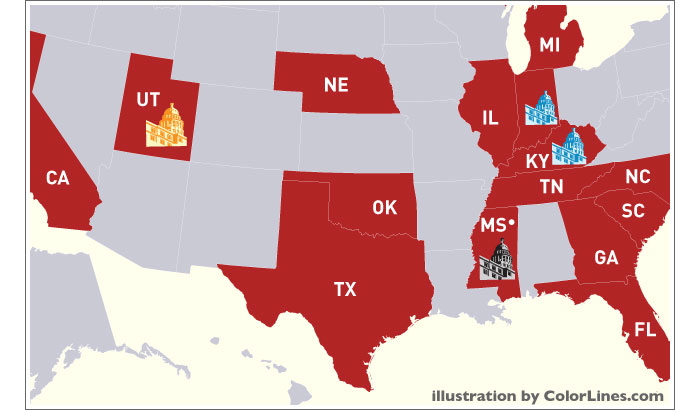Metastasizing xenophobia
Share

U.S. Greens work to stem anti-immigrant tide
by Randall Amster
With the passage of the now-infamous immigration law SB 1070 and its historically-tainted “show me your papers” logic, the eyes of the world have fallen upon my home state for all the wrong reasons: ethnic intolerance, racial profiling, status crimes, guilt by association, and the blatant erosion of the remaining tatters of hard-fought constitutional protections against unwarranted searches and seizures. In this light, telling people you’re from Arizona today is not unlike saying you’re from Mississippi in the 1960s or Germany circa 1939.
There has been a tremendous outcry and effort to stop these measures. The Green Party has made speaking out against these immigration laws a priority and has been active in immigration reform. Driving this urgency among many local activists, including Green Party members and candidates, is a sense that the Arizona case was merely a trial balloon for launching similar anti-immigrant efforts in other states. Arizona activists understood we were facing a genuine “buck stops here” moment in terms of how our struggle would play out in the not-too-distant future. Stopping SB 1070 in particular, and directly confronting Arizona’s brutal policies in general, was bound up with an implicit recollection of Martin Luther King, Jr.’s insight that “injustice anywhere is a threat to justice everywhere.”
In June of this year, both Alabama and South Carolina passed measures that are rhetorically competing for the misbegotten title of the “nation’s toughest immigration law.”
I reflected in an article on Common Dreams on the possibility of a coming proliferation of Arizona-style immigration laws spreading around the country: “From the Eastern Seaboard to the Rust Belt, states are looking to imitate Arizona’s ‘zero tolerance’ approach to immigration (an apt phrasing if ever there was one)…. The truly remarkable thing about this metastasizing xenophobia is that it is based entirely on empirical falsehoods, by most respectable accounts…. Take heed friends, lest you find that as goes Arizona, so goes the rest of the nation.”
Unfortunately, these predictions have steadily come to fruition in other states. A visual map from March 2011 was produced by ColorLines, which indicated, “at least 16 state legislatures have introduced SB 1070 copycat bills.” In many of these cases, the bills stalled, were tabled, or defeated, including a suite of ‘SB 1070 on steroids’ measures proposed but not passed in Arizona last spring. But in a number of states, including Indiana, Utah, Georgia, Alabama, and South Carolina, measures emulating or even expanding upon the harsh provisions of SB 1070 have been adopted. Oklahoma has considered a bill specifically dubbed “Arizona Plus” which, according to a report in AlterNet, would “order police to enforce immigration law, allow law enforcement to confiscate the property of undocumented immigrants, including homes and cars, and could criminalize providing social services and otherwise interacting with undocumented immigrants.” The Oklahoma bill eventually died in the state senate when community activists, human rights groups and social service organizations lobbied hard against it.
In Indiana, a federal judge recently blocked key portions of an anti-immigrant law set to take effect on July 1, 2011, including a provision allowing summary arrests of potential deportees without affording them an opportunity to appear before a judge. Utah passed a suite of immigration laws this past March hailed in some quarters as a more tolerant and reasonable approach to the issues, focusing primarily on the creation of “guest worker” programs. But as author David Bacon observes, “the Utah laws, however, are not new. And they’re certainly not liberal, at least towards immigrants and workers. Labor supply programs for employers, with deportations and diminished rights for immigrants, have marked U.S. immigration policy for more than 100 years.”
In June of this year, both Alabama and South Carolina passed measures that are rhetorically competing for the misbegotten title of the “nation’s toughest immigration law.” According to Reuters, the South Carolina law will require police to check the immigration status of any individual they suspect is in the country illegally after they have stopped that person for another reason (akin to Arizona’s SB 1070); will allow the state to revoke the business license of any employer who knowingly hires “unauthorized aliens;” and will create a new (and pejoratively named) “Illegal Immigration Enforcement Unit.” Alabama’s new law, as reported by the Associated Press, “was modeled on Arizona’s” and contains additional provisions “requiring schools to find out if students are in the country lawfully and making it a crime to knowingly give an illegal immigrant a ride.”
The passage of these new draconian laws has prompted the U.S. Department of Justice to initiate a review and call for meetings with state law enforcement officials in order to ascertain whether the federal government will file lawsuits similar to the successful challenge it launched against SB 1070. Yet here in Arizona, well before the federal government stepped in, the state Green Party took a strong stance on immigration issues, as reported by the local FOX News station: “Besides its position on the environment, there is another issue the Green Party is very clear about and that is its position on immigration. The Green Party is the only party that supports amnesty. ‘We want comprehensive immigration reform. We do not support any of this legislation, whether it’s SB 1070, anti-ethnic studies legislation, employer sanctions, English only,’ says Angel Torres, AZ House candidate.”
During the 2010 election cycle, Arizona Green Party (AZGP) candidates for state office were outspoken about immigration issues, including AZGP co-chair Torres, who noted that “as a Puerto Rican/Xicano and life-long Arizonan, SB 1070 is an insult to me, my family and the entire Latino community. To scapegoat or racially profile an entire community does not solve the problem. Our economic and immigration policies need to serve the interests of all working-class folks, not the interests of the corporations.”
Linda Macias, AZGP vice co-chair and 2010 State House candidate, added: “We need major federal reform of our immigration laws. Immigrants come to the United States in hope of a better life. We need to give them citizenship now and write immigration laws that are humane and just.” The AZGP further issued a press release asserting that “Arizona’s anti-immigrant legislation does not address the root causes of migration: poverty, lack of economic opportunity, war and political conflict, and environmental devastation…. The Arizona Green Party encourages all Arizonans to join the grassroots movement to overturn SB 1070, and organize for comprehensive immigration reform.”
As indicated by Leenie Halbert, AZGP and national Green Party co-chair, some important gains were made here, “In Arizona, we’ve been able to use our special status under the state’s Clean Elections laws, in which we participate in organized televised debates, to directly address issues like immigration and SB 1070, without parsing our words and hedging our positions like the Democrats do. We’re looking forward to the upcoming election cycle, as we prepare to field candidates who will represent our intention to become an electoral arm of a growing political movement against the state’s racist and draconian anti-immigrant laws. We are the only political party in the state that’s aligned with this perspective.”
The Georgia case similarly reveals an active Green Party agenda to forestall anti-immigrant sentiments and challenge the proliferation of harsh laws aimed at vulnerable segments of the population. Before the new law was passed, the Georgia Green Party (GGP) circulated a petition against it. Upon passage of the measure, the GGP issued a call for a travel and tourism boycott of the state. As GGP Secretary Hugh Esco observes, Georgia’s new law invokes the state’s history of lynching by making “hateful hospitality the law of the land,” and he inquires: “Why would our governor let white fear tear apart immigrant families?”
Along with the prior Arizona, Utah, and Indiana cases, a federal judge recently has enjoined the Georgia law from taking effect, and similar legal challenges are pending in Alabama and South Carolina. The arguments of equity and dignity advanced by Greens and others have thus far been successful in establishing a counter-narrative to that being plied by the anti-immigrant forces behind these odious laws. As Omar Jadwat, staff attorney with the ACLU Immigrants’ Rights Project, observes, “Georgia’s law, like Arizona’s, Utah’s, and Indiana’s before it, has been blocked by a federal court because it is fundamentally flawed. The universal failure of these laws in the courts is a stinging rebuke to state lawmakers who have pushed laws that would threaten all of our freedoms in order to express their hostility to immigrants and immigration.”
As the immigration debate continues to evolve nationally, the foundational Green Party values of social justice, equal opportunity, economic justice, nonviolence, and respect for diversity will undoubtedly serve to inform the discussion and help support the efforts to overturn this spate of ill-advised and unconstitutional laws that accomplish little more than institutionalizing racism and fear. The national Green Party, as well as state and local Greens across the country, can and must play a crucial role in stemming this divisive tide of anti-immigrant sentiment in the days ahead.
Randall Amster, J.D., Ph.D., is the Graduate Chair of Humanities at Prescott College. He serves as Executive Director of the Peace & Justice Studies Association and as Contributing Editor for New Clear Vision. Among his recent books are Lost in Space: The Criminalization, Globalization, and Urban Ecology of Homelessness (LFB Scholarly, 2008), and the co-edited volume Building Cultures of Peace: Transdisciplinary Voices of Hope and Action (Cambridge Scholars Publishing, 2009).








